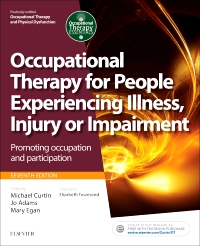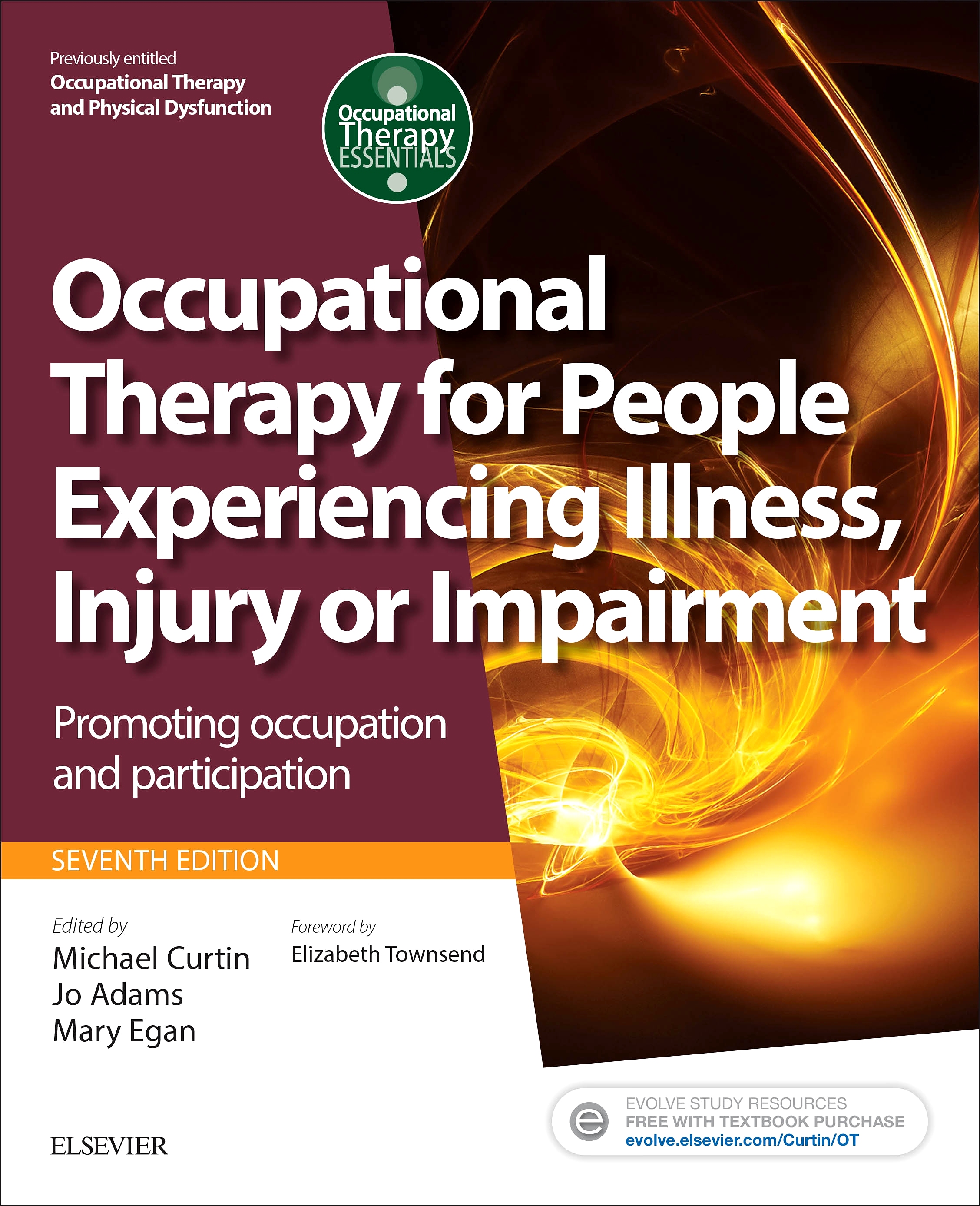
Occupational Therapy for People Experiencing Illness, Injury or Impairment - Elsevier eBook on VitalSource (previously entitled Occupational Therapy and Physical Dysfunction), 7th Edition
Elsevier eBook on VitalSource

The new title, Occupational Therapy for People Experiencing Illness, Injury or Impairment, reflects the knowledge, attitudes and skills that underpin the practice of promoting occupation and participation. It showcases how occupational therapists work with people – not medical conditions and diagnoses – as individuals, groups, communities, and populations.
The new edition now has additional chapters on the assessment and intervention stages of the professional reasoning process to assist development of enabling skills and strategies. It also includes many more practice stories throughout to provide authentic examples to illustrate the application of theory to practice. Learning is further reinforced via access to a new online resource – Evolve Resources – which includes MCQs, reflective questions and three bonus interactive practice stories with accompanying reflective videos. These are all signposted within the textbook.
Now compromising seven sections, which follow the professional reasoning format of the Canadian Practice Process Framework (CPPF), the new edition first tracks the evolution of occupational therapy in the context of health care. It then examines the foundational biomedical and social sciences, in addition to occupational science, before going on to the areas of assessment; writing occupation-focused goals; enabling skills and strategies which include advocacy and lobbying, public health, and community-based rehabilitation. The book ends with a chapter on developing effective reflection skills to enable occupational therapists to critically evaluate their practice, evolve as practitioners, and maintain and develop their professional competencies.
Newer Edition Available
Occupational Therapy for People Experiencing Illness, Injury or Impairment - Elsevier eBook on VitalSource
-
- Links theory with day-to-day practice, stimulating reflection
- Includes occupational, biomedical and social sciences that underpin occupational therapy practice
- Focus on working with groups, communities and populations in addition to working with individuals reflecting the evolving and expanding scope of practice
- Use of person-centred or inclusive and strengths-based language
- Three bonus interactive practice stories online at Evolve Resources and signposted at the end of Sections 3-7 in the textbook
-
Section 1: Introduction
1. Evolution of occupational therapy within the health care context (Michael Curtin, Jo Adams and Mary Egan)
Section 2: Underpinning sciences
2. Occupational science (Debbie Laliberte Rudman, Rebecca Aldrich)
3. Biomedical sciences (Lesley Collier, Richard Collier)
4. Social sciences (Judith Pettigrew, Katie Robinson)
Section 3: Professional reasoning
5. Client-centredness (Jacquie Ripat)
6. Communication in occupational Therapy practice (Sue Baptiste)
7. Professional reasoning in occupational therapy practice (Carolyn Anne Unsworth)
8. Canadian practice process framework (Noemi Cantin, Martine Brousseau)
9. Occupational therapy practice models (Merrill Turpin)
10. Occupational performance model (Australia): a description of constructs, structure and propositions (Chris Chapparo, Judy L. Ranka, Melissa Therese Nott)
11. The Canadian model of occupational performance and engagement (cmop-e) (Jane A. Davis)
Section 4: Assessment
12. Process of assessment (Clare Hocking, Karen Whalley Hammell)
13. Canadian occupational performance measure (Heather Colquhoun, Anne W. Hunt and Janet F. Murchison)
14. Task, activity and occupational analysis (Cynthia Perlman, Melanie Bergthorson)
15. Dynamic performance analysis (Rose Martini, Dorothy Kessler)
16. Analysis of occupational performance: motor, process and social interaction skills (Gill Chard, Sue Mesa)
17. Perceive, recall, plan and perform (prpp) system of task analysis and intervention (Chris Chapparo, Judy L. Ranka and Melissa Therese Nott)
18. Assessing the environment (Gunilla Carlsson, Agneta Malmgren Ange)
19. Reasoning underpinning assessments for people experiencing neurological conditions (Mary Egan, Lise Zakutney)
20. Reasoning underpinning assessments for people experiencing musculoskeletal conditions (Tanja A. Stamm, Stefanie Haider, Simone Luschin and Agnes Sturma)
21. Reasoning underpinning assessments for people experiencing medical conditions and conditions requiring surgery (Deidre Morgan, Celia Marston and Jenni Bourke)
Section 5: Goals
22. Writing occupation-focused goals (Julia Bowman, Lise Mogensen and Natasha A. Lannin)
Section 6: Enabling skills and strategies
23. Overview of enabling skills and strategies (Michael Curtin)
24. Advocacy and lobbying (Valmae Rose, Kevin Cocks and Lesley Chenoweth)
25 – Education (Tammy Hoffmann, Sally Eames)
26. Public health (Rachael Dixey)
27. Community development (Marie Grandisson, Anick Sauvageau)
28. Community-based rehabilitation (Kirsty Thompson, Christina L. Parasyn, Briana Wilson and Beth Sprunt)
29 – Coaching (Wendy Pentland, Amy Heinz, Jeanette Isaacs-Young and Jen Gash)
30. Psychosocial support (Jacqueline Mckenna)
31. Working with groups (Claire Craig)
32. Enabling sexuality (Narelle Higson)
33. Personal care (Helen Van Huet, Tracey Elizabeth Parnell and Virginia Mitsch)
34 – Leisure (Ruth Squire, Lucia Ramsey and Carolyn Dunford)
35 – Work (Yeliz Prior, Alison Hammond)
36. Biomechanical strategies (Hanif Farhan Mohd Rasdi)
37. Hand therapy (Kathy Whalley, Sarah Bradley and Jo Adams)
38. Orthotics
(Natasha A. Lannin, Iona Novak and Michelle Jackman)
39. Working with people living with vision impairment (Alexandra Lonsdale, Carlia Rix and Kirsty Stewart)
40. Optimising motor performance and sensation after brain impairment
(Annie Mccluskey, Natasha A. Lannin, Karl Schurr and Simone Dorsch)
41. Cognitive and perceptual strategies (Carolyn Anne Unsworth)
42. Cognitive orientation to daily occupational performance
(Helene J. Polatajko, Sara E. Mcewen, Deirdre R. Dawson and Elizabeth R. Skidmore)
43. Assistive technology (Natasha A. Layton)
44. Universal design (Sharon Joines, Andrew Payne)
45. Home modification (Catherine E. Bridge, Phillippa Carnemolla)
46 – Mobility (Kristy M. Robson)
47. Wheeled mobility and seating systems (Rachael Leigh Mcdonald)
48. Driving and community mobility (Marilyn Di Stefano)
49. Moving and handling (Tess Whitehead)
Section 7: Reflecting on practice
50. Reflecting on practice (Genevieve P. Epin)
Http://EVOLVE.ELSEVIER.COM/curtin/ot
Reflecting on practice – excerpts from bonus practice stories
Mrs Tremblay: A practice story of a person experiencing rehabilitation following a
stroke. reflecting on practice (Dorothy Kessler, Katrine Sauve-Shenk, Valerie Metcalfe)
Karin: A practice story of a person experiencing rheumatoid arthritis. reflecting on practice (Mathilda Bjork, Ingrid Thyberg)
Angela: A practice story of a person experiencing palliative care – reflecting on practice (Deidre Morgan, Celia Marston)



 as described in our
as described in our 